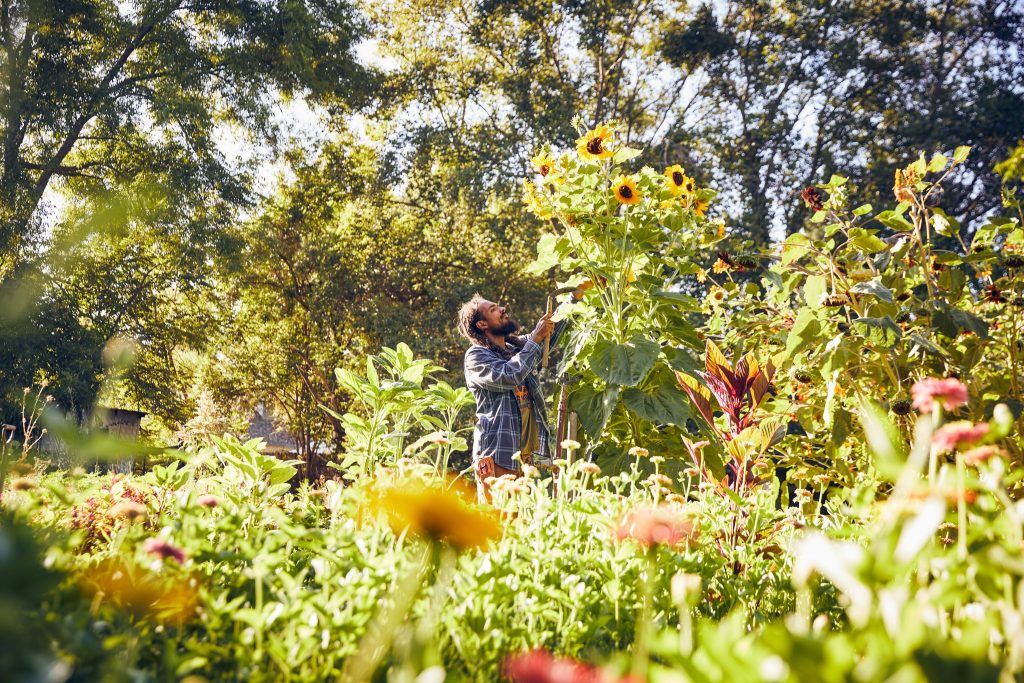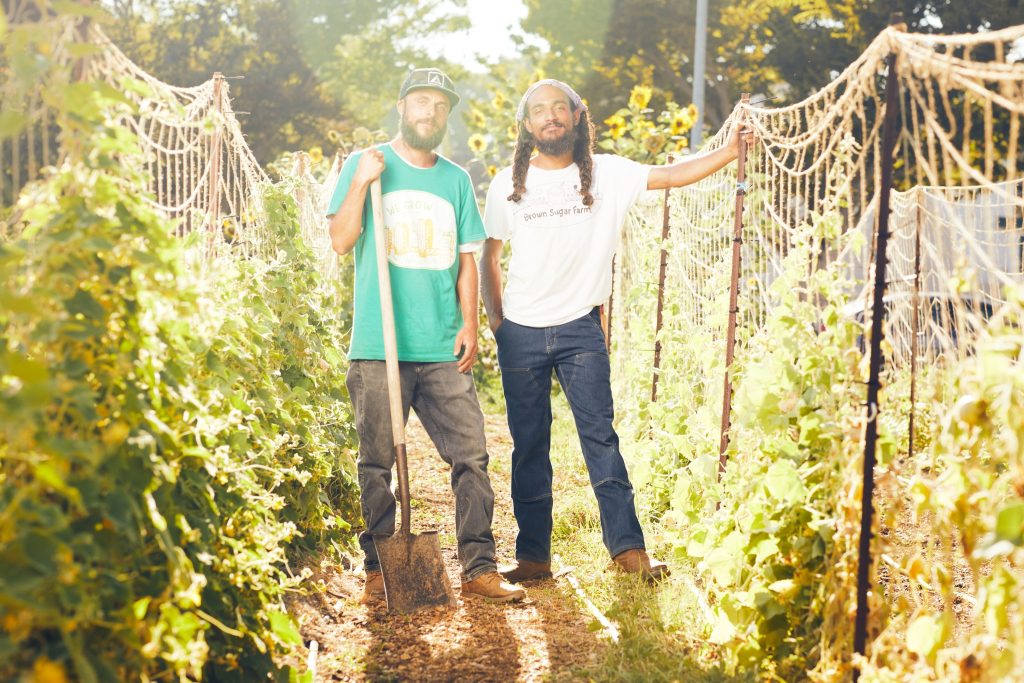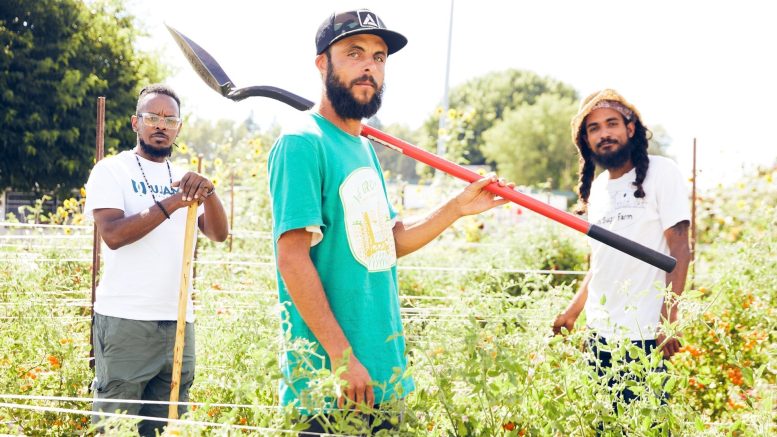Ujamaa Famer Collective fundraises to secure land tenure for farmers of color
By Rachel Leibrock
Since 2018, Nelson Hawkins has operated We Grow Urban Farm, a small plot in West Sacramento where he cultivates a colorful array of produce destined for farmers markets and community supported agriculture boxes.
Now, the land that he tills, plows and harvests is set to be razed for a new housing development set for construction by the West Sacramento Housing Development Corporation. Because he leases the acreage, Hawkins may soon be without a physical farmstead and his livelihood.
Hawkins, who is Black, knows his dilemma is part of a bigger problem.
“Land access is the biggest barrier for new and existing farmers of color,” he said. “And I’m experiencing that right now with my farm.”
Hawkins is also part of at least one solution to this obstacle. As a co-founder of the Ujamaa Farmer Collective, a Black-led agriculture business cooperative, he’s leading the effort to purchase farmland that will permanently support anywhere from 10 to 20 farmers. In July, the Yolo County Board of Supervisors approved partial funding for the collective, which has brought the collective closer to its goal of assisting historically underserved farmers.
“Our primary objective is to secure land access and land tenure,” Hawkins said. “This is prepping the political soil — the funding soil and the seed money for land acquisition.”
Historically, indigenous, Mexican and Black farmers have lost or been denied land access in California. The Ujamaa Farmer Collective is part of an effort to right centuries of societal injustices.
Ujamaa Farmer Collective, which includes Nathaniel Brown of Brown Sugar Farm and Keith Hudson of Grocery Croppers, LLC, formed in February. Ujamaa, the fourth principle of Kwanzaa, means “fraternity” in Swahili, and is associated with cooperative economics, community work and the practice of shared social wealth. The farmers see this as their collective’s embodying ethos.
Ujamaa was born of a revelation, Hawkins said. He first realized its possibility in 2021, when, as part of his work with the California Department of Food and Agriculture’s BIPOC Producer Advisory Committee, one of the committee’s Black elders shared a vision of land access for farmers of color.
They have big plans for the collective space where farmers will employ a mix of culturally historic and modern regenerative practices on plots as small as a half-acre and up to 20 acres.
“A hundred years ago, it wasn’t a practice to use all of these pesticides and harsh chemicals as fertilizers,” Brown said. “We are all very into organics and regenerative practices and growing things for the benefit of the soil.”
With an emphasis on skill and tool sharing, this is also a place where new and experienced farmers will work side-by-side.
“There’s this old farmer saying: How you grow the best corn is that you share your corn seed with your neighbors because their pollen attracts beneficial insects,” Brown said. “It creates a happier place for plants to grow.”
The seeds of social justice

The path to this farming utopia, however, has been uneven.
Earlier this year the collective was set to receive $2.5 million from the state, via allocations secured by Assembly Speaker Pro Tempore Cecilia Aguiar-Curry, who represents most of Yolo County, to fund the land purchase. The sum would have provided a chunk of the necessary buying power for the lot they had their eye on at the time: a 316-acre parcel in West Sacramento. Then, the funding was reduced — first to $1.25 million, then again to $750,000.
Eventually Aguiar-Curry, with help from Sen. Bill Dodd (D-Napa), secured $5 million for the Yolo County Board of Supervisors to allocate to local agencies, including the Yolo Crisis Nursery. From that allocation, Ujamaa received another $750,000.
“This investment is critical for the future of farming in Yolo County because it supports young BIPOC farmers who face tremendous challenges to be successful farmers,” Aguiar-Curry said. “California’s farmers and ranchers are diverse; now more than ever, we are seeing an increase in women farmers and farmers of color. It is imperative that we support and understand the opportunities they have and the challenges they face in order to thrive.”
Ujamaa has also received approximately $166,000 from the People’s Land Fund, an Oakland-based nonprofit that supports infrastructure needs of Black, Indigenous and POC farmers.
It’s still not enough capital, which has forced Ujamaa to lower its property budget. Initially, they had eyed a 60-80-acre property in Esparto but more recently adjusted that scale to consider options in the 30-60-acre range. Potential sites will undergo water and soil testing. Climate change is a factor, too: the right property won’t be prone to the type of flooding California has experienced during recent mega-storms.
To close the price-tag gap, Ujamaa will continue to fundraise for an additional $1.25 million, not just for land but for critical infrastructure such as irrigation equipment, wells and greenhouses.
“We are still looking for more funding and we’re trying to at least start escrow by the end of the year,” Brown said. “We have [a few] months to really strategize our capital campaign and seek out foundations for support.”
Although the collective has also raised more than $20,000 via various crowdfunding efforts, Hudson says they know they can’t rely on such support.
“We can’t lean too much on the community, so we are looking [at support] from foundations that are already working in the agriculture space,” he said.
Ujamaa currently gets such assistance from organizations such as the Center for Land-Based Learning, which works to educate and grow new farmers, as well Kitchen Table Advisors, a nonprofit that provides business consulting to small farms.

They also receive work in collaboration with the Community Alliance with Family Farmers, a Davis-based nonprofit that builds sustainable food and farming systems through policy advocacy.
Paul Towers, executive director with CAFF, said that the nonprofit’s recent survey of more than 500 California farmers clearly documented the need for land access.
“With respect to the land, the issues have just gotten more dramatic in California,” Towers said. “As with housing issues, the same is true for folks trying to access land for farming. The market has gotten harder unless you were born into it — unless you already had acquired wealth.”
It’s also a social justice issue, Towers adds.
“It’s important to say we took land away from many different groups in this country,” he said. “Whether it was indigenous, whether it was, Black folks, through slavery, or first-generation
Mexicans on this land in California, there’s so many folks that we stripped of land and resources.”
Collectives such as Ujamaa will help rectify those injustices as well as connect communities to the food they eat.
“Small farms are anchors in the local food system, but they also build community around them,” Towers said. “We see them at the markets, we have school field trips on these farms; we get to know them.”
As Ujamaa continues to fundraise and grow, it will partner with the Davis Food Co-Op to broaden its scope of outreach. Interested farmers may apply through Ujamaa’s website; those accepted for membership will partake in an experiential learning program that will generate a customized pathway to their goals.
Success, Ujamaa’s founders say, means farmers on the land, providing for local families and beyond.
“It’s also about reaching out into the broader food sector, such as restaurants and grocers,” Brown said.
They also see Ujamaa a model for other such collectives to steward the land.
“This is a launching pad for food production and distribution, especially for Black communities, but also BIPOC communities in general,” Brown said.
Ultimately, the goal is to build a collective that will serve for years to come.
“It’s important to ensure that we have this in place so that future generations will be able to farm on this land [beyond] five or 10 years,” Hudson said. “Without the land, we don’t have the opportunity.”
This story is part of the Solving Sacramento journalism collaborative. Solving Sacramento is supported by funding from the James Irvine Foundation and Solutions Journalism Network. Our partners include California Groundbreakers, Capital Public Radio, Outword, Russian America Media, Sacramento Business Journal, Sacramento News & Review, Sacramento Observer and Univision 19.


Be the first to comment on "Area Black farmer collective works to raise funds for land, critical infrastructure"